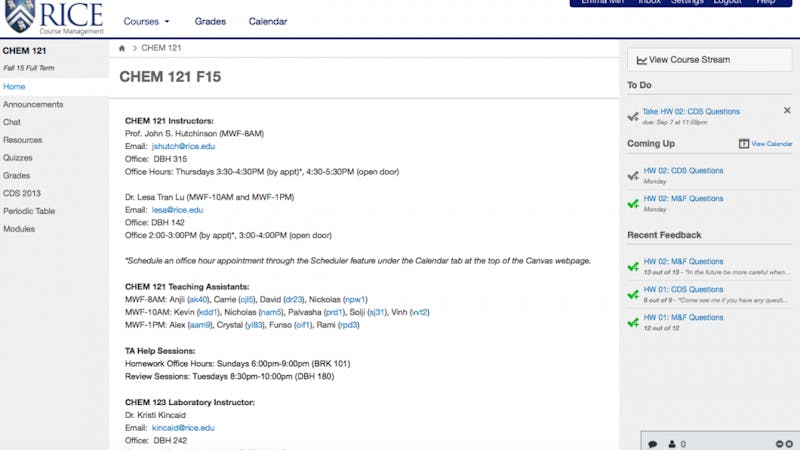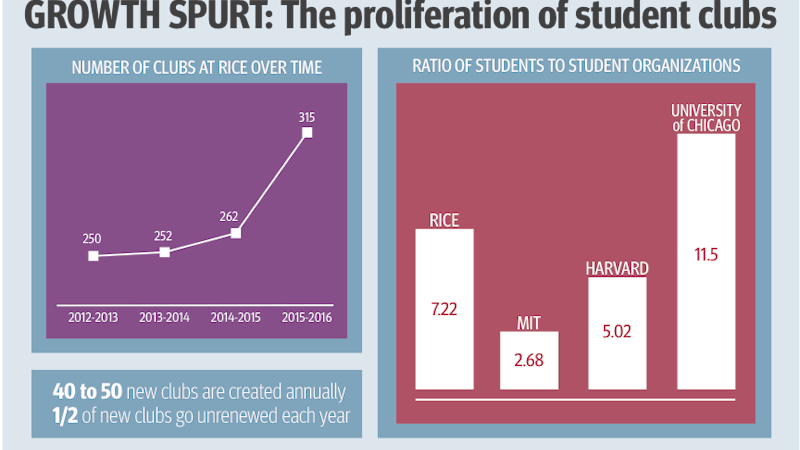NEWS
9/9/15 3:09pm
 By Jieya Wen
By Jieya Wen
Rice University is testing a new learning management system, Canvas, in 15 pilot courses involving 16 instructors and nearly 1,000 students, according to Director of Informational Technology and Access Services Diane Butler. Canvas could potentially replace Owlspace as the primary platform for learning management.“We are targeting faculty who use it in different ways,” Butler said. “Some use a lot of quizzes and tests. Some do more interactions and collaboration. We have [surveyed] across the board from large to small classes just to get a good idea.”The university is moving away from the open source Owlspace system currently in use to a vendor-supplied learning management system. Rice staff currently run the server that hosts Owlspace and maintain the service, while an independent vendor manages services for Canvas. “Owlspace is more than 10 years old,” Butler said. “Most of the [information technology] department is trying to move to cloud-based services. IT has posted a job, instructional designer ... to help faculty design courses [online] other than just putting a syllabus out there.”Butler said the pilot courses this semester test the possibility of moving web-based courses such as Computational Thinking (COMP 140) to Canvas without losing their current features. According to Scott Rixner, professor of computer science and the instructor of COMP 140, Canvas is significantly better than Owlspace because it allows instructors to release online material in parts in a way similar to Coursera, an online service previously used to teach COMP 140. “The biggest thing Canvas does is that it helps me to organize the material in a logical way and release it in stages,” Rixner said. According to Rixner, Canvas better meets the needs of on-campus teaching than Coursera by incorporating grades by teaching assistants.“[Canvas] is not as automated and as hands-off as Coursera is,” Rixner said. “Coursera expects you to never have a human grade anything. This causes problems for on-campus classes, when you do have TAs grading. So Canvas has facilities that have things that are automatically graded by machine and also allow you to grade things with TA. Canvas, in that sense, is better than Coursera.”Three courses in the summer session were the first pilot courses for Canvas. A working group consisting of representatives from Fondren Library, the Office of Digital Education and the Office of Information Technology has surveyed the classes’ students on their experiences. They will conduct further assessments on Canvas in the coming school year, according to Butler. “We did a pre-survey and we are going to do a post-survey,” Butler said. “In the middle, we are doing one-on-one assessments, some with students and with all the faculty who were teaching. [The assessments will] identify and help us move on to the next step.”Isabella Yang, a student in Biomedical Instrumentation Lab (BIOE 385), a pilot course for Canvas, said Canvas attempted to combine Owlspace and Piazza, an online course forum for discussion, but failed to integrate them efficiently. “There are options for Discussions, Conferences and Chat,” Yang, a McMurtry College junior, said. “Aren’t they necessarily the same?”Rixner said he agrees Canvas has redundant functions that might add to students’ confusion. “There is a lot of redundancy, but the instructor has the ability to pick and choose which ones you want to use for your course,” Rixner said.Steve An, a student in General Chemistry I (CHEM 121), another pilot course on Canvas, said Canvas is currently too rigid in the answers it accepts, which results in faulty grading. “Our answers have to be extremely specific,” An, a Martel College freshman, said. “My friend got points off because she put ‘grams’ instead of ‘g.’ Although she can tell the TAs and get the points back, we should not [have to] go through this extra process.”




